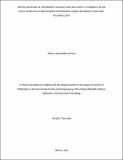| dc.contributor.author | Amasi, Aloyce | |
| dc.date.accessioned | 2022-09-22T06:52:25Z | |
| dc.date.available | 2022-09-22T06:52:25Z | |
| dc.date.issued | 2022-03 | |
| dc.identifier.uri | https://doi.org/10.58694/20.500.12479/1661 | |
| dc.description | A Thesis Submitted in Fulfilment of the Requirements for the Degree of Doctor of Philosophy in Environmental Science and Engineering of the Nelson Mandela African Institution of Science and Technology | en_US |
| dc.description.abstract | This study aimed to reconstruct the sedimentation rates over time and identify the changing
sources of sediment in a major hydropower reservoir in Tanzania, the Nyumba ya Mungu
(NYM). The study also aimed to evaluate the soil carbon as a proxy for erosion risk in the
catchment. Fallout 210Pb measurements were used to estimate age of sediment deposits and broad
changes in sedimentation rates were reconstructed. Sedimentation peaks were cross referenced to
geochemical profiles of allogenic and autogenic elemental constituents of the sediment column
to confirm a causal link. Finally, geochemical fingerprinting of the sediment cores and potential
sources were compared using a Bayesian mixing model (MixSIAR) to attribute the dominant
riverine and land use sources to the reservoir. Reservoir sedimentation generally increased from
0.1 g cm−2
yr−1
in the lower sediment column to 1.7 g cm−2
yr−1
in the most recent deposits.
These results correlated to changes in allogenic and autogenic tracers. The model outputs
revealed that the Kikuletwa River with 60.3%, was the dominant contributing tributary to the
total reservoir sediment and the Ruvu River 39.7%. However, downcore unmixing results
indicated that the latest increases in sedimentation is moistly driven by an increased contribution
from the Ruvu River. Cultivated land (CU) was shown to be the main land use source of riverine
sediment, accounting for 38.4% and 44.6% in Kikuletwa and Ruvu rivers respectively. The “soil
slake test” method for soil aggregate stability in water (WSA) indicated a significant decrease in
soil aggregate stability in cultivated land in comparison to other land use types which indicates
that the unsustainable land use changes can thus potentially increase the susceptibility of soils to
erosion by water when soil organic matter (SOM) is reduced. This study has explicitly
demonstrated that the integration of sediment tracing and -dating tools can be used for
quantifying the dominant source of sediment infilling in East African hydropower reservoirs.
The results underscore the necessity for catchment-wide management plans that target to limit
soil erosion and reduce further impact to rivers and reservoirs to maintain and enhance food,
water and energy security in Eastern Africa. | en_US |
| dc.language.iso | en | en_US |
| dc.publisher | NM-AIST | en_US |
| dc.subject | Research Subject Categories::NATURAL SCIENCES | en_US |
| dc.title | Investigation of sediment source and delivery dynamics in an east African hydropower reservoir using sediment tracing technology | en_US |
| dc.type | Thesis | en_US |

